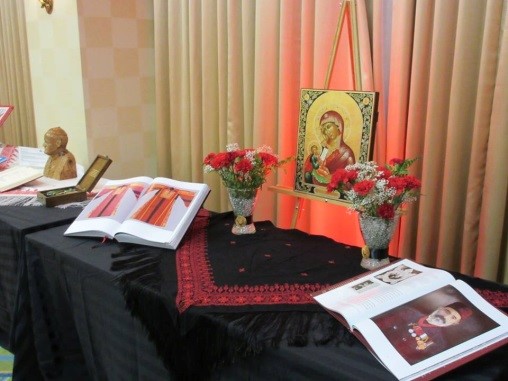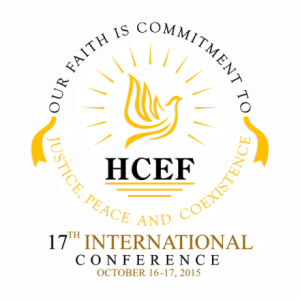
The Holy Land Christian Ecumenical Foundation (HCEF) held its Awards Banquet on the evening of October 16th and its 17th Annual International Conference on October 17th. With the theme of “Our Faith Is Commitment to Justice, Peace, and Coexistence,” the events attracted over 300 participants including representatives of over 25 religious, governmental, and human rights organizations from throughout the U.S., Chile, Jordan, Palestine and Israel.
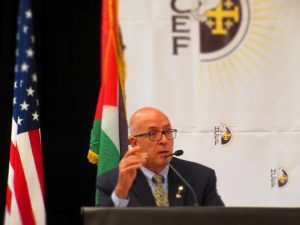
Sir Rateb Y. Rabie, KCHS, HCEF President/CEO, welcomed the participants and spoke about the purpose of the weekend: “We have all gathered here because we recognize our duty to Palestinian Christians, our brothers and sisters in Christ, the Living Stones. Not only have they preserved the message of Jesus, but they are also examples to the world of living peacefully among other faiths. And in particular, we highlight the historical and ongoing relationship with our Muslim brothers and sisters. We know that together we will restore dignity and justice to a land and people battered by conflict. This is why we are here – because we have hope in a brighter future, and that united we can fulfill that hope.”

Afterwards, Bishop Barry C. Knestout, Auxiliary Bishop of the Archdiocese of Washington, delivered warm greetings on behalf of His Eminence Donald Cardinal Wuerl, Archbishop of Washington: “The Cardinal wishes that he could be here as he is well aware of the important and necessary work of HCEF. This is our chance to learn and work together for the common good.”
There were five awardees at the banquet:
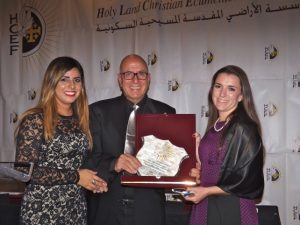
Chiara was introduced by Renee Rabie, and Sir Rateb Rabie joined in presenting the award.
Chiara Cardone, Palestinian Youth Advocate and Consultant of HCEF’s Know Thy Heritage (KTH) Program, received the KTH Youth Achievement Award for her sustained and extraordinary effort to love, support, and stand in solidarity with Palestinian youth. Accepting the award, Chiara said, “It has been a great honor to serve the children of Palestine. This gift is for them – they have earned it through persistent dedication to their homeland. I am proud to be part of that.
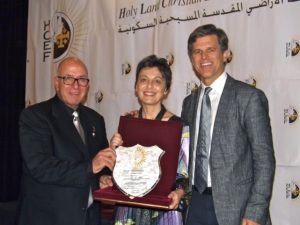
Anne-Elizabeth was introduced by Timothy Shriver, Chairman of the Special Olympics, and Sir Rateb Rabie joined in presenting the award.
Anne-Elizabeth Giuliani, Chaplain at Georgetown University, received the HCEF President’s Award for her 15 years of inspirational commitment to HCEF and tireless advocacy for its mission. Anne-Elizabeth commented: “I am so honored to be receiving such an award. The work that HCEF does is profound and necessary – together we must preserve the living stones.”
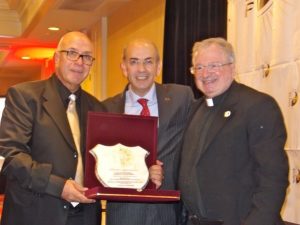
Dr. Sarsar was introduced by Father Drew Christiansen, HCEF cofounder and Board of Directors, and Distinguished Professor of Ethics & Human Development, Georgetown University, and Sir Rateb Rabie joined in presenting the award.
Dr. Saliba Sarsar, Chair of the HCEF Research and Publication Committee and Professor of Political Science at Monmouth University, received the HCEF Award, honoring his dedication to preserving the presence of Christians in the Holy Land. “I am proud to be part of the HCEF team. I know that my work goes far with this organization and I encourage everyone to join our efforts in any way they can, however big or small, we can make a difference,” said Dr. Sarsar.
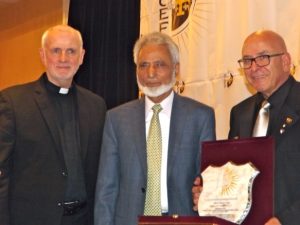
Dr. Syeed was introduced by Father Michael McDonagh, International Advisor to the Latin Patriarchate of Jerusalem, and Sir Rateb Rabie joined in presenting the award.
Dr. Sayyid M. Syeed, National Director of the Office for Interfaith & Community Alliances of the Islamic Society of North America (ISNA), received the Faith and Tolerance Award, recognizing the decades of work Dr. Syeed has put forth toward sustaining coexistence between Muslims and Christians. Dr Syeed said, “We commend the work of HCEF for bringing hope and encouraging peaceful coexistence among all faiths.”
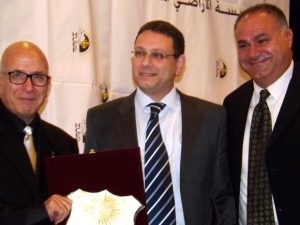
Adv. Rofa was introduced by Elias Saboura, Esq., , and Sir Rateb Rabie joined in presenting the award.
On behalf of the Society of St. Yves, the Catholic Center for Human Rights in Jerusalem and Bethlehem, Adv. Raffoul Rofa received the Living Stones Award which acknowledges the years of legal work the Society has undertaken to protect the dignity of Palestinians. Upon accepting the award, Adv. Rofa said, “We are proud to be partners with HCEF in working toward peace, justice and equality for all people in the Holy Land.”
The Conference was emceed by Dr. Sarsar and Dr. Stephen B. Corbin, former Special Olympics Senior Vice President of Community Impact and Support in Washington, DC and Living Faith Lutheran Church Elder in Rockville, MD. It began with an opening prayer by Father William J. Turner, HCEF Board of Directors, and the day’s event consisted of five main panels, a presentation, and a roundtable discussion—all mainly focused on the need to be educated about issues surrounding Christians in the Middle East in general and in the Holy Land in particular as well as the need to advance justice, peace, and coexistence in the Holy Land and beyond.
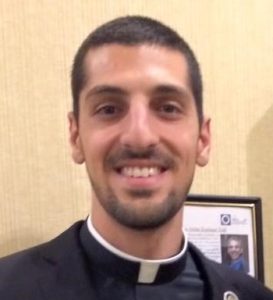
Zuhair Madanat, a First Theology Seminarian at Mount St. Mary’s Seminary in Emmitsburg, MD, moderated the first panel on “Palestinian Christians: Persecuted on All Sides.” With the burning of churches and holy places, such as the Church of the Multiplication of Loaves and Fish, and the new threat by ISIS, which has threatened to “purify” Jerusalem if Christians do not leave the sacred city, the panel examined the conditions affecting Palestinian Christians and looked to signs of hope for the future.
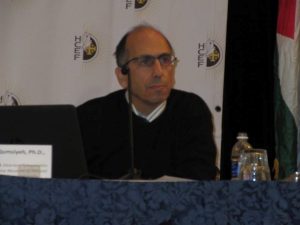
Dr. Mazin Qumsiyeh, Professor & Director, Cytogenetics Lab, Palestine Museum of Natural History, Bethlehem University, stated that “living in Palestine takes sacrifices and Christians leave not because of economic reasons but because of political reasons.” Reporting on some of the horrors taking place in the Holy Land, Dr. Qumsiyeh explained that “we Palestinian Christians called for action, for example, via Kairos Palestine.” Kairos Palestine is an organization of Palestinian Christians who call on Christians around the world to counter the occupation.
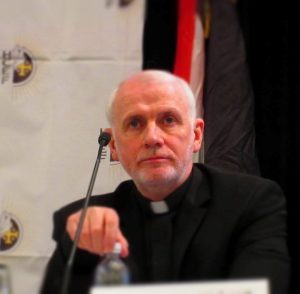
Father Michael McDonagh, International Advisor to the Latin Patriarchate of Jerusalem, said that Palestinian Christians feel betrayed and are suffering. Many have addressed their tough circumstances by emigrating. For Fr. McDonagh, the main reason for emigration is that Palestinian Christians “have been and continue to be treated as non-people. Human dignity is robbed, land is confiscated, economic opportunities are severely limited, and political realities exert tremendous pressure.” While Fr. McDonagh recognized the economic and political difficulties and the strong inclination to escape them, he instructed that “the element of divine vocation—call—must feature high on Christian’s mind, if we want to keep a Christian presence in the Holy Land. He pointed to HCEF as an opportunity to answer that call.”
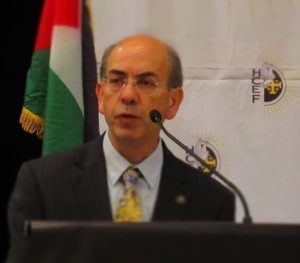
Dr. Sarsar then presented on “Who are the Christians of the Middle East?” He spoke of the Christian presence as dating back to the advent of Jesus Christ, which has been uninterrupted for more than 2,000 years. While Christians constituted some 20 percent of the population at the start of the 20th Century, that number today is less than 3.5 percent. Even though wars and instability have ravaged Christian and other communities and even though some Christian communities are being threatened and persecuted, signs of hope present themselves, as expressed by the Egyptian Family House initiative that fosters religious unity, Christian-Muslim dialogue in Lebanon, the work of HCEF and Caritas in Jordan and Palestine, and HCEF’s founding of the U.S. Muslim Christian Coalition for the protection of Christian and other religious minorities in Arab countries.
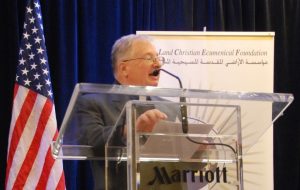
Father Drew Christiansen, HCEF cofounder and Board of Directors, and Distinguished Professor of Ethics & Human Development, Georgetown University, moderated the second panel on “Christians of the Middle East in Crisis.”
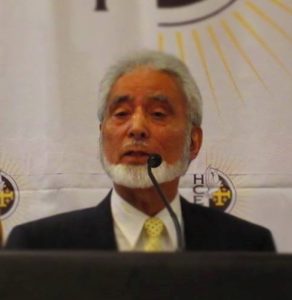
Dr. Sayyid Syeed discussed how the American Muslim community has emerged as a new face of Islam in a democratic pluralistic society. This development has made American Muslims more conscious of their responsibility toward minorities in the Muslim world. As he stated, “the Quran commands the protection of houses of worship of all faiths, respect for diversity, and cooperation with different faith groups in struggling against violence, poverty, injustice, and exploitation.”
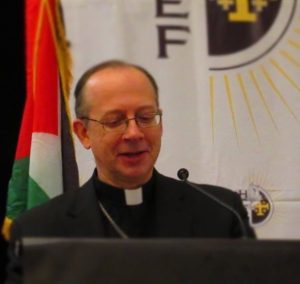
Bishop Knestout anchored his presentation in religious liberty. He argued that efforts to establish societies or regimes that are not based “on the dignity of the human person or on an authentic communion among people of different backgrounds and experiences inevitably become a form of tyranny and are destructive to the human person and to societies.” He outlined practical steps that anyone can follow to support Christians in the Middle East, and he concluded by saying, “All those who are persecuted due to religion or national origin, and all those who are affected by war, are human persons, made in the image of God, bearing inherent dignity and deserving of our respect and care as well as protection by law from persecution and abuse.”
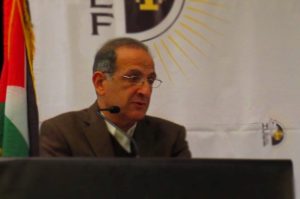
Dr. James Zogby, President of the Arab American Institute, commended HCEF on its service to Christians of the Holy Land and on the high quality of discourse that takes place in HCEF forums. He argued that the status of Christians in the Middle East must be politicized, as humanitarian efforts will not suffice. Christian communities are being threatened and destroyed in Iraq and elsewhere, Israel operates with impunity, and yet nothing substantial is being done to ameliorate the circumstances of Middle East Christians. “There is a need for accountability,” he stated. He urged the conference participants to advocate for religious freedom by writing to the U.S. Commission on International Religious Freedom, among others.
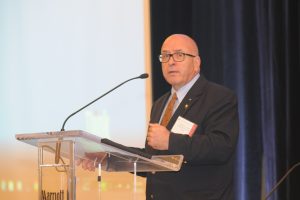
Sir Rabie led the roundtable discussion on the HCEF movement. He highlighted major HCEF accomplishments and invited HCEF staff and volunteers to share their experiences. In addition to celebrating the sainthood of two Palestinian women in Rome, HCEF opened the Bethlehem Museum, led the fifth delegation of the KTH program, inaugurated the Future Business Leaders program, formed and is heading the U.S. Muslim Christian Coalition. Sir Rabie invited all to become involved, live an integral, purposeful life, and join the HCEF movement to make a real difference. He pointed out several volunteering opportunities available in both HCEF offices, Bethesda and Bethlehem.
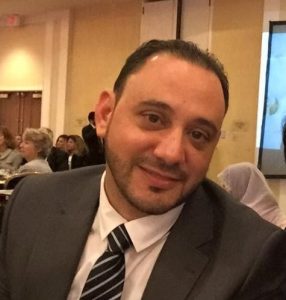
During this roundtable, HCEF participants had the special opportunity of hearing from Eng. Anthony Habash, HCEF’s Regional Manager in Bethlehem, Palestine. Eng. Habash made the long trip from Palestine for the Banquet and Conference so he could give participants a firsthand account of the work HCEF is doing in the Holy Land. “We are impacting thousands of lives with our programs – rebuilding homes, caring for the elderly, educating children, preserving Palestinian and Christian heritage and more. We are not a big organization, but we act like one and produce big results. This is due to our passionate team and of all of you – because of your desire to care for the Living Stones. As a Palestinian-Christian myself, I thank you. I also bring the gratitude of the many thousands whose dignity you have restored. Still, there is much work to be done. Come see for yourself. I urge you to visit the Holy Land and see the work of HCEF firsthand. I know you’ll be even more convinced of the necessity of our mission, and compelled to do your part for the people of the Holy Land.”
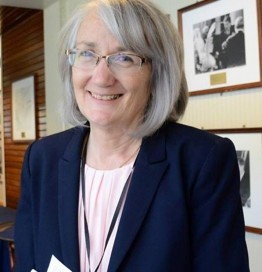
Delinda Curtiss Hanley, Executive Director and News Editor, Washington Report on Middle East Affairs, also longtime activist for human rights, moderated the third panel on “Human Rights Violations in the Holy Land: Legal and Ethical Perspectives.”
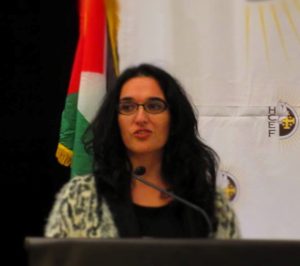
Shadia Sbait, co-Founder and General Coordinator of Iqrit Community Center, presented the village of Iqrit as a clear example of Israeli human rights violations. “The people of Iqrit were forcibly transferred from their village in 1948,” she explained, “but have not been permitted to return to their homes despite an Israeli Supreme Court ruling, governmental promises, and Israeli ministerial committee recommendations.”
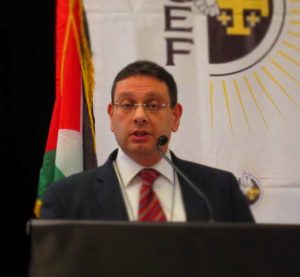
Adv. Rofa, Director of the Society of St. Yves, spoke of Israel’s systematic policy of discrimination. He offered a variety of examples, such as “the lack or improper planning rights for Palestinians resulting in the issuance of demolition orders against their structures in East Jerusalem and area C of the West Bank, the confiscation of privately owned Palestinian lands and declaring them as state land and then dedicating large tracks of these lands for settlement expansion, limits on the freedom of movement, and the building of the annexation or separation wall.” He then focused on the residency rights violations, including family unification and child registration, and the Cremisan Valley case, “which sets the clearest example for Israeli annexation policies under the pretext of ‘security.’” Both speakers concluded by indicating the need for global cooperation in order to protect Palestinian rights, especially through the effective implementation of international law.
The fourth panel on “The Role of Women and Youth in Building the State of Palestine” was moderated by Noor Shayeb, Human Resources Associate at Chemonix, and KTH alumna. A main point is acknowledging the fact that Palestinian women are at the heart of their families, society, and national development, and that the youth are the future leaders of Palestine. The panelists agreed that Palestinian women and youth are already mobilizing as active champions of justice, peace, and coexistence.
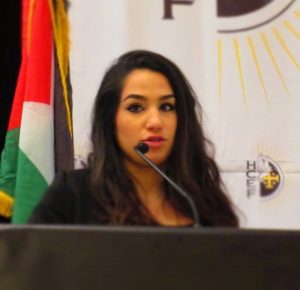
Rana Shouman, Pharmacist, Mercy Hospital, and KTH alumna, spoke of how she is raising awareness, advocating for coexistence, and promoting social justice and peace.
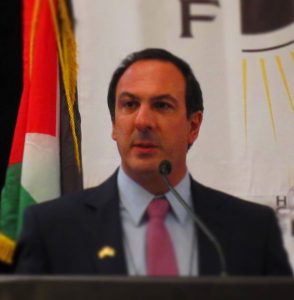
Jorge Daccarett, Consultant, Bank of Palestine, Santiago, Chile, explained that the young represent a strong entrepreneurship spirit, and one way to bring the Palestinian Diaspora together is through business. “Palestinians are among the richest peoples of the Middle Eastern because we are multicultural – we are all over the world, we speak different languages, but all have Palestine in our blood.”
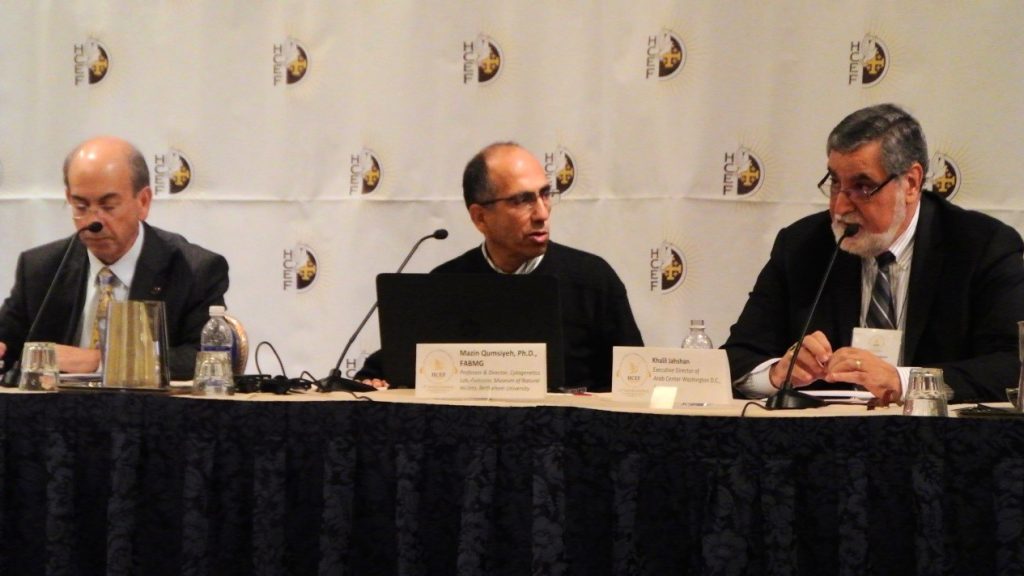
The fifth and last panel on “Western Policy toward Palestine” was moderated by Dr. Sarsar. Dr. Qumsiyeh chronicled the 140-year documented history of Western involvement and expressed optimism as the path of “might makes rights” is nearing the end. According to him, “the suffering in these last few years might escalate as colonialism and imperialism never give up power easily.”
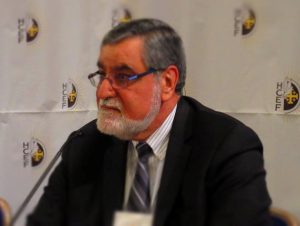
Professor Khalil Jahshan, Executive Director of Arab Center Washington DC, Inc., asked if Western policy toward Palestine is part of the problem or the solution? According to him, “Unfortunately, Western policies in support of Israel have historically failed to distinguish between their unshakable support for Israel’s security and their alleged political and moral opposition to its excessive occupation of Palestine.” The resultant U.S. and other Western policies “have obviously become part of the problem and undermined their own attempts, genuine or otherwise, to resolve the conflict politically.” Prof. Jahshan concluded his presentation by holding that “the future of Palestine is not a function of Western policies or Israeli policies … but of the national will of the Palestinian people.”
Also included as part of the Conference was a special travelling exhibit of the Bethlehem Museum. Among the impressive pieces were olive wood replicas of the Church of Nativity and the Holy Sepulcher, rare embroidered dresses from the Munnayer collection, Papal relics, including the chair used by Pope John Paul II during his visit to the Holy Land, and Mother of Pearl masterwork pieces provide by Palestinian-Columbian artist, Enrique Yidi.
The conference concluded with a commitment to put faith into action and double efforts to support Palestinian Christians and others in the Holy Land. Fr. Christiansen led the conference participants in a closing prayer.
If you are inspired by the work HCEF has done, expressed by the 17th International Conference and Banquet as a whole, please JOIN US and aid our effort!
There are countless opportunities to work for justice in the Holy Land and serve those in great need, both in Bethesda and Bethlehem – our brothers and sisters, preservers of the faith and keepers of the Mother Church.
Save the Date for HCEF’s 18th International Conference
& Awards Banquet
October 14-15, 2016
You can donate to our cause HERE
And if you are interested in volunteering with HCEF, please contact our Communications and Programs Coordinator, John Karvonen by
Email: jkarvonen@hcef.org or Phone: 301-951-9400 ext. 205
Learn more at www.hcef.org


